
Tradumatica-Traduccio i Tecnologies de la Informacio i la Comunicacio
Scope & Guideline
Exploring the Intersection of Language and Technology
Introduction
Aims and Scopes
- Integration of Translation Technologies:
The journal extensively discusses the integration of various translation technologies, such as machine translation (MT), computer-assisted translation (CAT) tools, and neural networks, into traditional translation practices. - Literary Translation and Technology:
A significant focus is placed on literary translation, exploring how technology affects the quality, creativity, and processes involved in translating literary works. - Accessibility in Translation:
The journal emphasizes the importance of accessibility in translation, particularly for marginalized groups, including people with disabilities, highlighting how translation technologies can enhance accessibility. - Training and Education in Translation Technologies:
There is a consistent focus on training and educational methodologies for future translators, emphasizing the skills needed to utilize technology effectively in the translation process. - Research on Translation Quality:
The journal includes research on translation quality management, analyzing the effectiveness of machine translation and post-editing practices in various contexts.
Trending and Emerging
- Machine Translation and Its Applications:
There is a marked increase in research exploring the implications of machine translation, particularly its applications in various fields, including literature and humanitarian contexts. - Collaborative Tools in Translation:
The exploration of collaborative possibilities offered by CAT tools and cloud-based platforms is gaining traction, reflecting a trend towards teamwork and shared resources in translation processes. - Human-Machine Interaction in Translation:
Emerging themes focus on the relationship between human translators and machine outputs, examining how this interaction shapes translation quality and practices. - Impact of Technology on Literary Translation:
An increasing body of work is dedicated to understanding how technology affects literary translation, particularly regarding creativity and the preservation of 'literariness' in translated texts. - Translation Quality Management in the Age of AI:
Research is trending towards the development of new frameworks for translation quality management that incorporate artificial intelligence and machine learning, reflecting the evolution of the translation profession.
Declining or Waning
- Traditional Translation Methods:
There appears to be a waning interest in traditional translation methods without technological integration, as more research focuses on the synergy between technology and translation. - Non-Literary Translation Studies:
Studies focusing exclusively on non-literary translation, such as technical or legal translation, are less frequent, indicating a shift towards more interdisciplinary studies that incorporate technology. - Theoretical Approaches to Translation:
Theoretical discussions that do not incorporate practical applications of technology in translation have become less common, as the journal prioritizes empirical studies and technology-driven methodologies.
Similar Journals
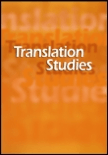
Translation Studies
Advancing Knowledge in Linguistics and LanguageTranslation Studies is a premier journal in the field of linguistics and language, published by Routledge Journals, Taylor & Francis Ltd, and is recognized for its exceptional impact within the academic community, boasting a Q1 classification in Linguistics and Language as of 2023. With its ISSN 1478-1700 and E-ISSN 1751-2921, this journal serves as an eminent platform for disseminating groundbreaking research, theoretical advancements, and practical applications related to translation and interpreting studies. Covering a comprehensive scope, the journal publishes original research articles, critical reviews, and theoretical discussions, making significant contributions to both the arts and humanities as well as social sciences. The journal is published in the United Kingdom and has maintained a solid reputation from its inception in 2008 through to 2024. Positioned within the top ranks of Scopus in both the language and linguistics categories, it ensures visibility, making it an essential resource for scholars, practitioners, and students who wish to stay informed of the latest trends, methodologies, and discussions in translation studies.

Quaderns-Revista de Traduccio
Unveiling the Art of Translation ExcellenceQuaderns-Revista de Traduccio, published by the Universitat Autònoma de Barcelona, is a prominent journal in the field of Linguistics and Language, which has garnered recognition for its scholarly contributions since its inception. With an ISSN of 1138-5790 and an E-ISSN of 2014-9735, this journal has maintained an active publication schedule across notable cycles, contributing valuable insights from 2011 to 2018 and continuing from 2020 to 2024. As a Q3 category journal in both Arts and Humanities and Social Sciences related to Language and Linguistics, it occupies an important niche, ranking #607 out of 1088 and #692 out of 1167 respectively. Though currently not an open-access journal, its rigorous peer-review process ensures that published articles meet high academic standards, making them relevant for researchers, professionals, and students alike. Housed in Cerdanyola del Vallès, Barcelona, this journal serves as a critical platform for the dissemination of cutting-edge translation studies and linguistics research.
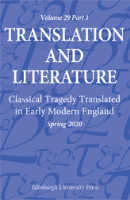
Translation and Literature
Fostering Dialogue Across Literary LandscapesTranslation and Literature is a leading academic journal published by Edinburgh University Press, focusing on the intricate relationship between language and literature within the realms of translation studies. With an ISSN of 0968-1361 and an E-ISSN of 1750-0214, this journal provides a crucial platform for scholars and practitioners to explore and disseminate research that addresses both the theoretical and practical aspects of translation. Since its inception in 1996, Translation and Literature has established itself as an essential resource, particularly noted for its contributions to the fields of linguistics and literary theory, as indicated by its Q4 ranking in both categories in 2023. The journal's articles are designed to foster dialogue across disciplines, encouraging innovative thinking and collaboration among researchers, professionals, and students alike. Access to this valuable resource is currently available through subscription, ensuring high-quality scholarship reaches a diverse audience dedicated to advancing the understanding of translation's role in literature.
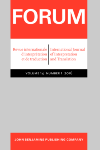
Forum-Revue Internationale d Interpretation et de Traduction-International Journal of Interpretation and Translation
Advancing the Art of Translation and Interpretation.Forum-Revue Internationale d’Interprétation et de Traduction - International Journal of Interpretation and Translation is a prestigious peer-reviewed journal published by John Benjamins Publishing Co, renowned for its contributions to the fields of linguistics and literary theory. With an ISSN of 1598-7647 and an E-ISSN of 2451-909X, this journal provides a vital platform for researchers, professionals, and students to disseminate and engage with innovative research findings and theoretical developments in interpretation and translation studies. As of 2023, it holds a respectable Q3 ranking in Linguistics and Language and a Q2 in Literature and Literary Theory, underscoring its growing influence within academia, reflected by its Scopus rankings. The journal encompasses a diverse array of perspectives and methodologies to enhance the understanding of translation practices and their implications in contemporary society. Although the journal operates within a limited open access framework, its commitment to high-quality scholarship makes it an essential resource for those seeking to contribute to and stay abreast of advancements in this dynamic field. Established to foster interdisciplinary dialogue, the journal invites submission from a wide range of scholarly approaches and encourages collaborative discourse among linguists, translators, and literary theorists.
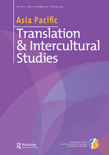
Asia Pacific Translation and Intercultural Studies
Advancing intercultural dialogue through translation.Asia Pacific Translation and Intercultural Studies is a vital academic journal published by Routledge Journals, Taylor & Francis Ltd, focusing on the interdisciplinary fields of translation studies and intercultural communication. With an ISSN of 2330-6343 and E-ISSN of 2330-6351, this journal plays a pivotal role in advancing scholarship in cultural studies and linguistics, earning a commendable Q2 ranking in both fields for 2023. The journal, catering to researchers, professionals, and students alike, aims to foster a deeper understanding of the myriad ways cultural contexts shape translation practices in the Asia-Pacific region and beyond. Despite its open access status being undisclosed, it regularly publishes high-quality peer-reviewed articles that contribute to the academic landscape, with a Scopus ranking reflecting its relevance and impact in interrelated domains. As the journal continues its mission from 2019 to 2024, it stands as an essential resource for anyone interested in the dynamics of translation and intercultural interactions in a rapidly globalizing world.
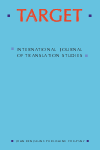
Target-International Journal of Translation Studies
Unveiling New Horizons in Translation StudiesTarget - International Journal of Translation Studies, published by John Benjamins Publishing Co, stands as a leading academic forum in the fields of translation studies, communication, and linguistics. Established in 1989, this prestigious journal has successfully evolved, boasting a Q1 classification in 2023 within both Communication and Linguistics and Language categories, reflecting its significant impact and influence in these disciplines. With an impressive positioning in the Scopus ranks, it is recognized as one of the top journals in its field, being placed in the 88th percentile for Language and Linguistics, and in the 87th percentile for Linguistics and Language within the Social Sciences. Its rigorous scholarly contributions foster a greater understanding of translation practices, theories, and methodologies, making it an essential resource for researchers, professionals, and students alike. While it does not currently offer open access, its comprehensive articles and studies greatly enrich discussions and advancements in translation and communication studies.
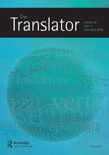
Translator
Exploring the Art and Science of TranslationTranslator is a leading journal in the fields of Communication and Linguistics, dedicated to exploring the complex dynamics of translation through critical analysis and scholarly discourse. Published by Routledge Journals, Taylor & Francis Ltd from the United Kingdom, this journal boasts a significant impact within its academic community, holding a prestigious Q1 ranking in Linguistics and Language and a Q2 ranking in Communication as of 2023. With a strong focus on interdisciplinary studies, it aims to foster an understanding of translation as both a linguistic and culturally significant practice. Researchers and practitioners alike can engage with cutting-edge research and extensive discourse, making it a valuable resource for advancing knowledge in this vital field. The journal spans a remarkable convergence of insights from 1995 to 2024, reflecting its long-standing commitment to academic excellence and innovation. Access to its resources is facilitated through various platforms, ensuring that findings are readily available to the broader academic community.

Translation & Interpreting-The International Journal of Translation and Interpreting
Unlocking Insights in Language and Literature for Global DiscourseTranslation & Interpreting is the premier Open Access journal dedicated to the intricate fields of translation and interpreting, published by the University of Western Sydney's Interpreting & Translation Research Group. With an established reputation since its inception in 2009, this journal has quickly ascended to become a vital resource, recognized in the 2023 Q1 quartile rankings for both Linguistics and Language as well as Literature and Literary Theory. Its high standing is further supported by impressive Scopus rankings, placing it among the top journals in its field—#21 out of 1106 in Literature and Literary Theory and #204 out of 1088 in Language and Linguistics. With a commitment to disseminating original research and innovative practices, Translation & Interpreting serves as a crucial platform for scholars, practitioners, and students who aspire to deepen their understanding of translation dynamics and interpretation methodologies. Based in Australia, the journal actively contributes to global discourse by making research freely accessible, upholding the values of transparency and inclusivity in the academic community. Embark on your exploration of this influential journal that shapes the landscape of translation and interpreting research.

Bible Translator
Bridging Cultures Through Sacred TextsThe Bible Translator is a distinguished journal dedicated to the scholarly exploration and analysis of biblical translations and their impact across cultures and traditions. Published by SAGE Publications Ltd, this journal seeks to bridge the gap between theology, linguistics, and intercultural communication, providing an essential platform for researchers, translators, and educators alike. With an ISSN of 2051-6770 and an E-ISSN of 2051-6789, it ensures broad accessibility to its readership. Although it currently does not operate under an Open Access model, the journal's rigorous peer-review process and commitment to high-quality research make it a vital resource for professionals and students in the fields of religious studies and translation theory. Contributing to the ongoing discourse around scriptural texts, The Bible Translator remains pivotal in fostering understanding and appreciation of the intricacies involved in translating sacred writings, thereby reinforcing its importance in both academic and applied contexts.

Panacea-Boletin de Medicina y Traduccion
Exploring the Intersection of Language and HealthcarePanacea-Boletin de Medicina y Traduccion, published by TREMEDICA, serves as a valuable academic resource within the field of linguistics and language translation. With an ISSN of 1537-1964 and coverage from 2012 to 2023, this journal has established itself with an impressive Q2 ranking in the 2023 category of Linguistics and Language, indicating its significant contribution to the scholarly dialogue in this domain. The journal's rankings within Scopus, including the 41st percentile in Arts and Humanities and the 38th in Social Sciences, highlight its recognition and relevance among peers. Although it operates under a traditional access model, the journal remains committed to disseminating high-quality research that bridges the gap between medicine and linguistic translation, thereby enhancing interdisciplinary understanding and collaboration. For researchers, professionals, and students alike, Panacea-Boletin de Medicina y Traduccion stands as an essential publication for exploring emerging trends and fostering innovation in linguistic practices.